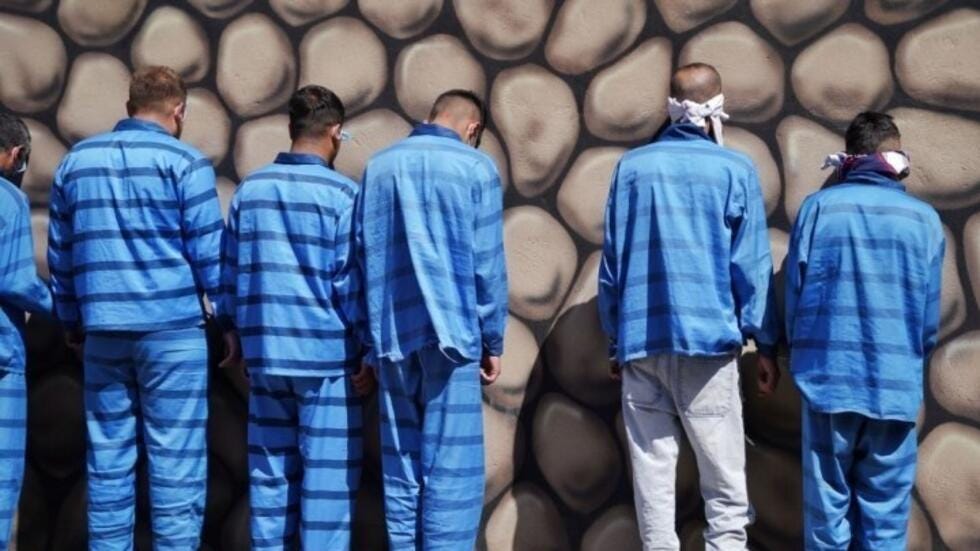War in Iran Diary Entry 3
On the war's aftermath and Luthen's insight into the failure's of the Pahlavi opposition
It’s been over a week since a ceasefire took hold between Iran and Israel (and it should be noted US). The time from when the US president announced a ceasefire in the evening of June 23 and the last bombs and missile strikes landed was one of the worst nights for civilian populations. With the internet functioning again, messages of fear flooded the phones. “I think it’s the end,” they all seemed to say, leaving “end” to mean whatever it was going to be.
Over the 12 days of fire, over 900 Iranians and 28 Israelis were killed.1 This includes the 79 people—prisoners, families of prisoners, prison employees, and people living in and around the neighborhood—killed when Israel targeted Iran’s Evin prison in what was initially framed as a symbolic act. As Siamak Namazi who had been imprisoned there for 8 years wrote: “The bombs did not distinguish between evil magistrates and political prisoners, or the 18- to 20-year-old conscripts tasked with escorting them. Were human rights lawyers, who braved those halls to defend the defenseless, among the casualties? How many janitors and clerks—who commute for hours from Tehran’s poorest suburbs—are now dead or injured? And what of the families gathered in the waiting area, as my own mother once did, pleading for visits, for medicine deliveries, or simply for confirmation that their loved ones were even being held inside Evin at all?”2
“The end” is the beginning of horrors. In the case of Evin, prisoners have been moved to other prisons such as Qarchak and Tehran-e Bozorg, overcrowding them and making intolerable conditions even more inhumane. Prisoners and their families have spoken of “drinking water” that is salty, shortage of bottled water from the commissary, cockroaches and bed bugs.3
Since the ceasefire there has not been a collective sigh nor a deep inhale marking the fact that one is still alive. Instead, you feel people in Iran are holding their breath, bodies tensed up, waiting. Rumors abound that this is just a period of rearmament. It is also a period of increased repression.
Last week the Iranian parliament passed an anti espionage bill that exponentially increases the surveillance power of the state and spells out punishment for what the IRI deems to spying for Israel and other “enemy states.” It explicitly states: “Any type of political, cultural [my emphasis], media, or propaganda that creates public fear, disunity, or brings harm to national security is considered a crime.” This includes sending video or images to enemy media (with the paucity of reporters on the ground many news networks outside of Iran depend on citizen journalism) and “taking part in illegal gatherings in war time.”4
Even before the bill went into effect (sidenote: the bill indicates that it applies retroactively) in just one week, the Iranian government has arrested over 1000 people, set up checkpoints on the streets, searched the homes of Bahais, warned the heads of the Jewish community, executed Kurdish minorities, and detained Afghan refugees, all in the name of national security.
This of course is not uncommon. Nor is it unfamiliar. The Patriot Act in the United States, passed in the aftermath of 911, was a surveillance law that had and continues to have a disproportionately punitive effect on non-citizens and immigrants.
The new law in Iran further securitizes any protest (the use of “cultural” quoted above is chilling). It remains to be seen how it's going to play out the next time there are domestic protests or if there will even be more domestic unrest considering the rearmament the population fears is not limited to weapons of war but also those of surveillance and repression.
If there is one silver lining it’s how the Israeli decision to attack Iran has for all intents and purposes removed the son of the deposed Shah, Reza Pahlavi (seen here upside down) as a viable opposition to the Islamic Republic.
During those 12 days Pahlavi’s support for Israel’s attacks on Iran went entirely against the mood of a nation who whether they agreed with the regime or not were absolutely against any kind of aggression on the integrity of Iranian soil. Multiple times he asked for people to come out into the streets and topple the regime. People instead huddled in basements or evacuated their homes for fear of losing their own lives or the lives of their children. The day the United States attacked Iran’s nuclear sites, Pahlavi called it Iran's Berlin Wall moment, leaving one to wonder whether he meant the moment soldiers shot at those trying to cross it for decades.
I don’t want to keep harping on the man Profs. Sadeghi-Boroujerdi and Nikpour in their sharp essay have called a “failson.” I keep hearing my grandmother’s voice when I do saying: “God has already hit him in the head خدا زده تو سرش Why do you keep doing it?” But considering the fact that he continues to appear on Western news media and goes to European parliaments declaring himself the chosen leader of the Iranian people, we do need to keep talking about him even if he is not, to quote both Logan Roy and one of my best friends “serious people.”
It was not until his Berlin Wall failed to crumble that I realized the man’s fatal flaw is that nothing he says is inspirational, nothing he says rouses one from sleep let alone makes people want to sacrifice life and limb. He cannot do that maybe because in the 46 years since the revolution, which he has used to not work a single day in his life, he also did not have time to learn how to use words to create emotions in people. But more importantly, he cannot do that because he has never sacrificed, lived for people, experienced the kind of loss that functions as fuel on the timber that is words. Words that can light a fire within us. Words that can make people see that their own sacrifices will be met syllable by syllable, limb by limb.
I cannot make my friends watch Andor, no matter how much I tell them it’s a Trojan horse: A Star Wars story that hides an ethnographic study of how rebellions and revolutions take shape. (Sidenote: the fight against the Empire in this universe is a rebellion not a revolution, a fact I find intriguing.) I somewhat understand. For me, Star Wars outside of the first three, which are deeply embedded in my memories of moving from the US back to Iran after the revolution in 1979, are not particularly interesting.
Andor though is different. It is Tony Gilroy’s summary of Algeria, Vietnam, the Red Brigade, the French Revolution, and the Russian Revolution to just name a few.5 In Andor, an antiquities dealer named Luthen is the shadowy organizer, leader, and funder of the early days of rebellion in the Empire. (Yes this is a study/show that also focuses on how rebellions are funded.) He is no saint. He is not pure. You never hear him speechify about “the people” as so many social media “leaders” do today. Gilroy never asks us to worship Luthen but within him he has distilled the essence of opposition leaders.
In a crucial scene, Luthen is confronted by a man whom he has forced to spy for the rebellion. Lonni is scared. Lonni is angry. Lonni wants out. “And what do you sacrifice?” Lonni asks Luthen. Luthen responds:
“Calm. Kindness. Kinship. Love. I’ve given up all chance at inner peace. I’ve made my mind a sunless space. I share my dreams with ghosts. I wake up every day to an equation I wrote 15 years ago from which there’s only one conclusion, I’m damned for what I do. My anger, my ego, my unwillingness to yield, my eagerness to fight, they’ve set me on a path from which there is no escape. I yearned to be a savior against injustice without contemplating the cost and by the time I looked down there was no longer any ground beneath my feet.
What is my sacrifice?
I’m condemned to use the tools of my enemy to defeat them. I burn my decency for someone else’s future. I burn my life to make a sunrise that I know I’ll never see. And the ego that started this fight will never have a mirror or an audience or the light of gratitude.”
It should be noted that over this same period over a 1000 people were killed in Gaza. https://www.haaretz.com/opinion/editorial/2025-06-26/ty-article-opinion/trump-ended-the-israel-iran-war-with-a-single-post-he-can-do-the-same-for-gaza/00000197-a8be-d6b3-abf7-e8ffa8860000
https://time.com/7297385/evin-prison-israeli-airstrike-bombing-iran-islamic-republic-innocent-deaths/
https://www.hra-news.org/2025/hranews/a-55285/
https://www.bbc.com/persian/articles/c3vd57l0qxvo
One fantastic story line is based on this 1907 bank robbery conducted to fund the Bolshevik’s: https://en.wikipedia.org/wiki/1907_Tiflis_bank_robbery




